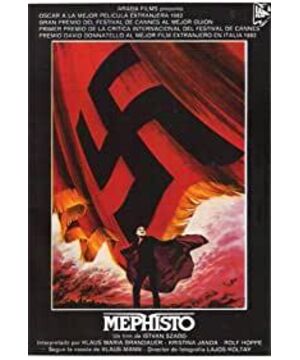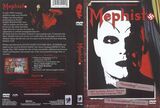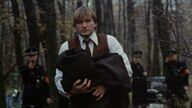The film "Mephistopheles", co-produced by Hungary and the Federal Republic of Germany, unexpectedly won the title in the competition for the best foreign language film at the 54th Academy Awards in 1982. The film has been screened in 33 cities in the Federal Republic of Germany and most countries in the world, and has achieved great success.
After the release of Mephistopheles, many national newspapers and magazines published comments one after another, praising the film for no lust, no horror scenes, no blatant anti-Nazi shouting along the street, no hateful whistleblowers, but a true depiction of the Nazis In the era of emptying, the historical picture of artists being humiliated and human nature being distorted depicts how a wise coward tasted totalitarianism and was eventually abandoned as a split personality.
If a film can arouse people's thinking about history and philosophy of life, and the characters, scenes, and atmosphere it depicts linger in people's minds and remain in their memory for a long time, it should be said that such a work is a masterpiece. And Mephistopheles is such a thought-provoking film.
The film is based on the German writer Klaus Mann's novel of the same name, and the protagonist of the novel comes from a historical prototype, so the film brings a strong biographical writing style of historical figures. The famous Hungarian director Istvan Szabo adapted the film based on the novel with his grim reflection on the history of the Nazi "Third Reich". He used the stage career and personal destiny of the protagonist Hefgen as a thread, and put the "swastika" in the word "swastika". The complex state of human nature under the shadow of the flag vividly reveals some unique aspects of historical life and the historical facts of the past scenes of blood through the image of "people". The film has been recreated by Sabo's originality, artistically dissecting a bloody era, allowing people to see Huffgen wrapped in the disgusting Nazi historical turbidity, unable to identify the direction of history, between man and demon. Swing, and finally become a short-lived "harlequin", so that the audience can be inspired by this historical figure, and through this history, they can realize some profound philosophy.
Mephistopheles is the name of the devil in Goethe's famous book "Faust". The novels and movies are named after this. It has a profound meaning. It is both derived from Goethe and endowed with a strong historical allegory. Through his own research on natural science, Goethe used dialectical thought to shape the two main characters in the play "Faust": Faust and Mephistopheles, one person and one demon. The devil in Goethe's works has its specific and distinctive symbolism in Saab's films, and it also reveals a profound philosophy of dealing with devils. As an artistic image, it is extracted from the German national cultural tradition. Mephistopheles is a negative "elf". For Huffgen, this is not only a stage role he successfully played, but at the same time, it can also be said that it is a shameful record of his humanity's alienation under the pressure of Nazi politics. In the meantime, the things left for people to think about are quite heavy.
Hegel saw character as "the true center of ideal artistic expression". Characters in modern films are not only a kind of cohesion of real relationships, but also infiltrated with the artist's unique life experience and comments on social history. Such characters are generally called "expressive" characters. Huffgen is a person, with human nature, feelings and love, but under certain conditions, his character is divided, with a very despicable political speculation. He sees only a small part of the world—the part that he can take advantage of and ultimately become an actor of his own life and destiny. His split-type character is mainly manifested in two different periods: the Hamburg period and the Berlin period and his relationship with several women.
During the Hamburg period, Huffgen wanted to be famous and jealous. Backstage he heard the audience applaud the performance of actress Dora from Berlin, gnashing their teeth and envy. But when he met Dora, he showed an attentive look and congratulated her. Dora told him: "I heard that you are very talented!" He wanted Dora in front of everyone. Repeat the words you just complimented him. He secretly found a black woman to practice dancing, he took a fancy to Barbara and married her, all for his own despicable purpose.
He finally came to Berlin with the help of Barbara's father. Lindenthal, who he called "stupid cow" at the beginning, became the main ladder for him to climb up. He met the Nazi general through "stupid cow", and then put Mikras rallied to protest against fascism and tipped the general, causing him to be secretly shot by the Nazis, while he became the manager of the National Theater. Huffgen's allegiance to the fascists in Berlin was split and two-sided. The successful performance of "Faust" at the National Theater, the general received him in the box, he was excited and uneasy, just as his appearance was a devil's mask: "sacred", "mighty", and his His eyes were soft and his hands were weak. He heard that his friend had suffered misfortune, and he went to the general's office to ask questions and was reprimanded. He had to go to the dressing room of the theater and hugged his wife, whose face was covered in oil, and tears welling up in his eyes. tears! Huffgen's face was stained with white paint, and the two smiled bitterly at each other. This was his most profound reflection, a kind of helpless reflection.
Huffgen's dual personality is also reflected in his relationships with several women. Juliet, an attractive dark-skinned woman, whom Huffgen loved, but not openly. Although he was married to Barbara, he kept in touch with Juliet until the Nazi general ordered him to send the black woman away, not even a photo. For his own benefit, he had to give up Juliet, but he still begged the Nazis not to hurt her, secretly sent her to France, and later visited her in France.
芭芭拉是赫夫根的妻子,她其貌不扬,但有一个很有名望的教授父亲。赫夫根打着自己的如意算盘,使自己从二流演员跃入一流行列,纳粹上台后,芭芭拉与父亲逃离德国,赫夫根毅然与她断绝关系,完全与法西斯同唱一个调。
There is another woman, Miss Niebuhr, who has long been interested in Huffgen, but unexpectedly Huffgen ignored it and married her good friend Barbara. Later, when I heard that Barbara had left Germany, Niebuhr made a special trip to Berlin to visit Hefgen, but Hefgen didn't take her seriously. It was not until he was appointed by the Nazis as a manager that he was eager to find a legitimate manager. wife, and married Niebuhr.
From this, it is not difficult to see that the character of Huffgen is complex, split, multi-faceted, and a complex of dual personalities.
There are many factors that contributed to the success of this film, mainly the director's profound artistic skills and rich life experience. His films are often intertwined with lyrical tenderness, love and understanding. In his films, he does not focus on the statements of historical figures and events, but on the portrayal of the same type of characters represented by the protagonist, not only emphasizing the impact of dramatic conflicts At the same time, it also explores the symbolism and implication of the picture shape. The most representative scene in the film is the ending, which fully reflects the symbolism and allegory of the modeling treatment in Saab's film. In the dark and empty square, suddenly searchlights came from all directions, and a strong beam of light cut through the night sky and shone on Huffgen's face. He fled around like a wounded mouse, but the beam of light followed him closely, and finally He shone through his face, leaving only a shadow. The director chose the Olympic Stadium because he regarded the venue for the World Games as a big stage, and the Nazi generals shouted that they would perform a play here. He has also been performing on this stage, and his performance has reached the level of incisiveness. The strong beam of light symbolized the Nazi rule at the time, and Huffgen became a small historical buffoon in terms of power. Here, the historical irony is strong.
View more about Mephisto reviews








